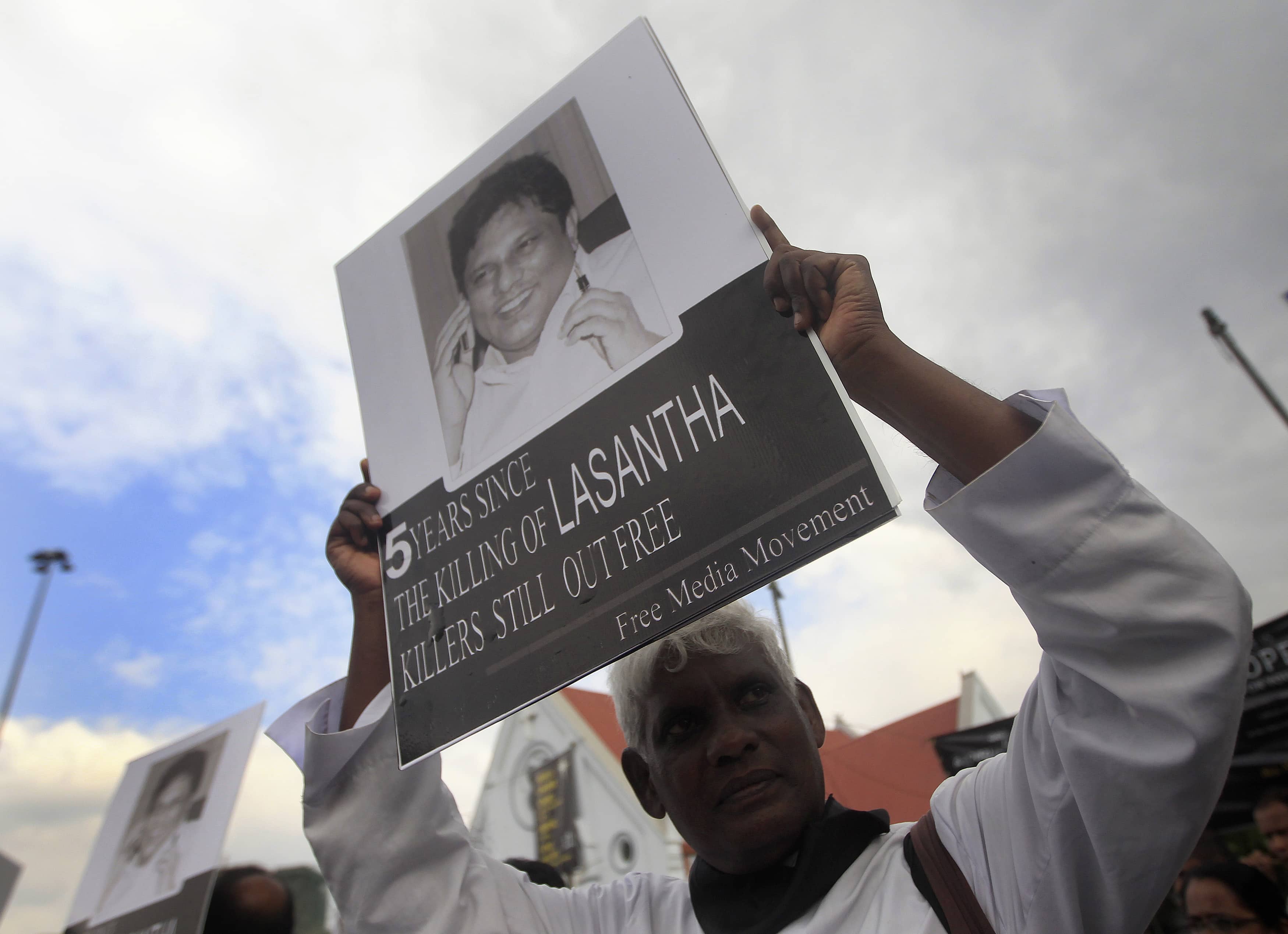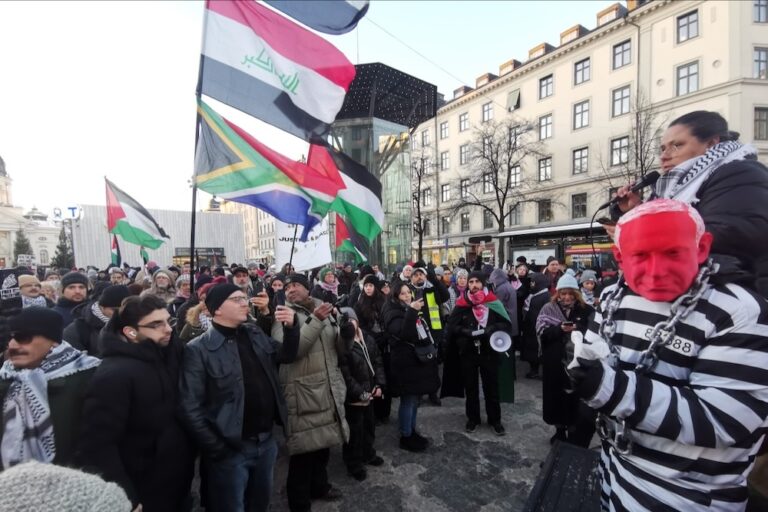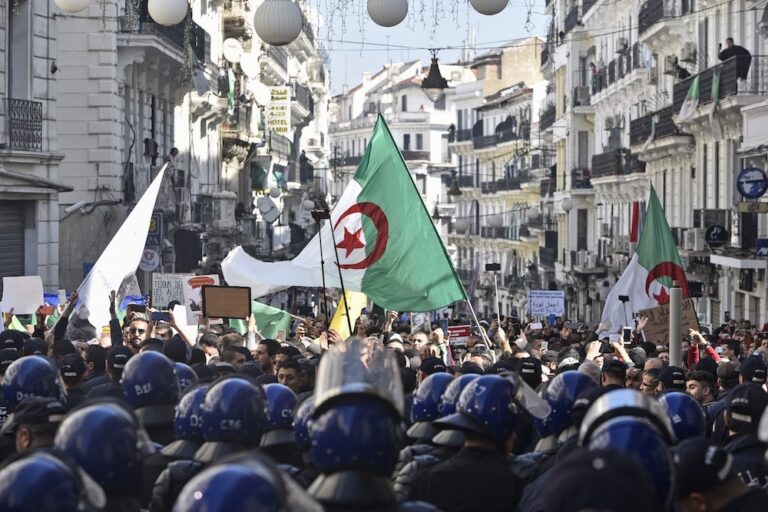Journalism, the exercise of free expression, is a basic right both for practitioners and for the readers, viewers and listeners who benefit from it. They should be able to practice this right without fear of persecution. If they are to suffer, their oppressors must face justice.
By Padraig Reidy / 6 November, 2014
Lasantha Wickrematunge knew he would be murdered. The founding editor of Sri Lanka’s Sunday Leader was unpopular because he wanted his paper to tell the truth. During his country’s long civil war, Wickrematunge’s loyalty was not to Colombo, or to the Tamil Tigers, but to journalism.
This would be no defence for Lasantha. President Mahinda Rajapaksa repeatedly referred to him as a “terrorist journalist” and “Kotiyek” (a Tiger).
According to exiled journalist Uvindu Kurukulasuriya, shortly before Lasantha was killed, the president offered to buy the Sunday Leader, with the intention of muting its voice. Lasantha declined the generous offer. On 8 January 2009, he was shot dead.
Days later, an astonishing editorial, written by Lasantha before his death, appeared in the Sunday Leader, and subsequently in newspapers throughout the world. After describing his pride in the Sunday Leader’s journalism, Wickrematunge wrote chillingly: “When finally I am killed, it will be the government that kills me.”
Lasantha’s murder was shocking. As was the murder of Hrant Dink, the Armenian editor who “insulted Turkishness” by daring to speak of the genocide of his people; as was the murder of Anastasia Barburova, the young Novaya Gazeta reporter who investigated the Russian far right; as was the murder of Martin O’Hagan, who took on the criminality of Northern Ireland’s loyalist gangs. As were the murders of the dozens of Filipino journalists killed in the Maguindanao massacre in 2009, too numerous to name, caught up in a ruthless turf war.
Then there are the reporters killed in war zones. The conflict in Syria has been a killing field for journalists. Where once the media were seen as protected, even potential allies, now they are seen as targets. The killings of Steven Sotloff and James Foley by ISIS in Iraq brought back memories of the beheading of Daniel Pearl in Pakistan in 2002. As Joel Simon of the Committee to Protect Journalists relates in his forthcoming book, the New Censorship, that crime marked a turning point. In the Pearl case, even Osama bin Laden, who viewed the media as a potential tool in his global war, was shocked by the tactic employed by his lieutenant Khalid Sheikh Mohammed, who claimed to have carried out the murder himself. From that point on, journalists were not just fair game, but trophies.
As money is drained from news, many organisations choose not to send correspondents to areas where reporters are needed most. Too dangerous, too expensive. As a result, freelancers, local journalists and fixers take ever greater risks. Under-resourced, undersupported and out on a limb, they are picked off.
Regional journalists covering tough domestic beats are easy prey. In Mexico, drug cartels boast of their ability to murder reporters. In Burma, the army kills a reporter who dares report its activities.
The numbers are horrifying: over 1,000 media workers have been killed because of their work since 1992.
Every single time, the message is sent: don’t get involved; don’t ask questions; don’t do your job. No journalism here. No inconvenient truths, no dissenting voices.
With rare exceptions, those responsible for these crimes act with impunity. Sometimes, as in the case of Anna Politkovskaya, outspoken on war crimes in Chechnya, the man who pulled the trigger is traced but those who gave the orders remain untouched. In over 90 per cent of cases of attacks on journalists, there are no convictions.
There is no greater infringement of human rights than to deliberately take an innocent life. The killing of a journalist also signals contempt for the concept of free expression as a right. As the United Nations Plan of Action on the Safety of Journalists and the Issue of Impunity, states, violent attacks on journalists and free expression do not happen in a vacuum: “[T]he existence of laws that curtail freedom of expression (e.g. overly restrictive defamation laws), must be addressed. The media industry also must deal with low wages and improving journalistic skills. To whatever extent possible, the public must be made aware of these challenges in the public and private spheres and the consequences from a failure to act.”
In that famous final editorial, Lasantha Wickrematunge wrote: “In the course of the last few years, the independent media have increasingly come under attack. Electronic and print institutions have been burned, bombed, sealed and coerced. Countless journalists have been harassed, threatened and killed. It has been my honour to belong to all those categories.”
Like many journalists, Lasantha prided himself on bravery: there is no higher compliment in the profession than to call a colleague “courageous”.
But there is a danger in this that we create martyrs: that we become enamoured of the idea that a good journalist should die for the cause. That persecution and suffering are marks of valour.
They are not. Journalism should be intrepid, of course, but we shouldn’t accept the idea that intrepid journalism comes with a price. Journalism, the exercise of free expression, is a basic right both for practitioners and for the readers, viewers and listeners who benefit from it. They should be able to practice this right without fear of persecution from states, criminals or terrorists. If they are to suffer, their oppressors must face justice.
This article was originally posted on 6 November 2014 at indexoncensorship.org



